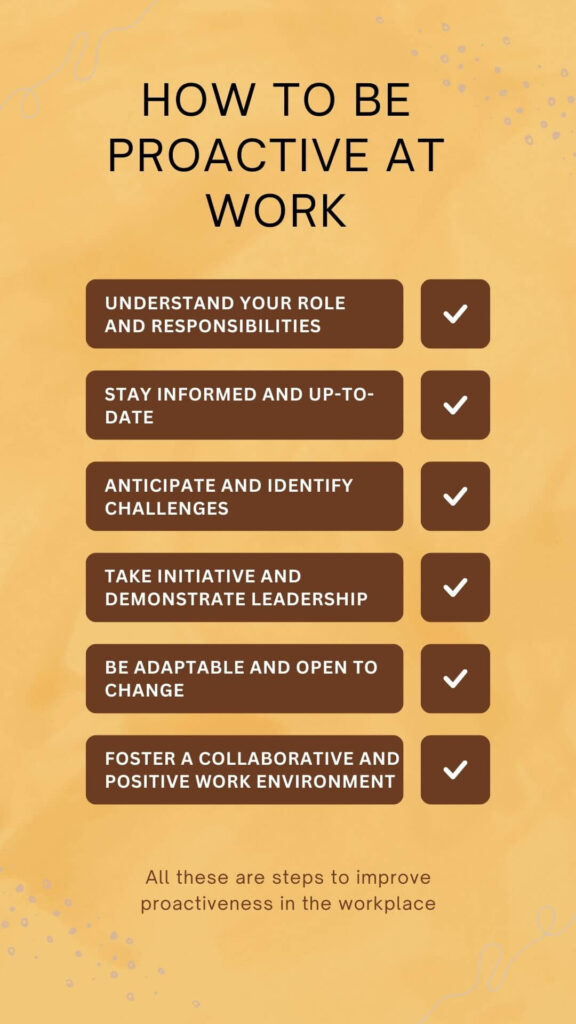How to Be Proactive At Work as an Employee (In Six Ways)
Are you wondering how you can be proactive at work?
In this quick guide, you’ll learn what being proactive means and the benefits of proactivity in the workplace. Plus, you’ll discover six practical ways to stay proactive at work without getting tired.
Before we jump into these strategies to improve your proactiveness at work, note this: Most workers are only productive for two hours and 53 minutes in an eight-hour day.
Interestingly, employees’ proactivity at work can profoundly influence that. As a worker, you can excel at your tasks and take ownership and control of career success by becoming more proactive at work.
What does it mean to be proactive at work?
Being proactive at work is like getting ready for things before they happen. It’s like a 10-year-old child doing his homework before his teacher gives it to him.
So, at work, it means planning and preparing for tasks before they come up. Being proactive is also about being a good team player.
It’s like helping your team members or colleagues when they’re struggling. And that means noticing when your colleagues might need help and offering a hand.
Simply put, proactivity in the workplace is all about workers getting ahead and being helpful team members. As they say, “Don’t wait for the perfect moment; take the moment and make it perfect.”
Benefits of proactivity in the workplace
Being proactive in the workplace comes with several benefits. Below are some of them:
1. Efficiency
When employees are proactive at work, they tend to take the initiative to plan and organize their work. And that leads to more efficient and streamlined processes.
2. Problem Prevention
As you already know, proactivity involves anticipating challenges and taking steps to prevent them. And that reduced the likelihood of issues arising in the first place.
3. Increased Productivity
Workers become productive by staying ahead of tasks and addressing potential problems early. In turn, that contributes to overall team productivity.
4. Improved Time Management
Proactive workers are better at managing their time and resources than reactive ones. Not only that, proactive employees are good at effectively setting priorities.
5. Innovation
Proactivity in the workplace fosters a mindset of continuous improvement and innovation among employees. They actively seek ways to improve processes and contribute new ideas.
6. Enhanced Communication:
Proactiveness at work promotes a positive and collaborative work environment. And employees that demonstrate proactive traits communicate more effectively and share updates, ideas, and concerns.
7. Career Advancement
Proactive behavior is often associated with leadership qualities, and individuals who take initiative are more likely to stand out and advance in their careers.
8. Reduced Stress
Anticipating and addressing challenges in advance can reduce stress levels, creating a more positive and conducive work environment.
9. Team Collaboration
Proactive staff often contribute to a collaborative team culture by actively participating in discussions. They share insights and always look for way to assist colleagues.
10. Adaptability
Workers who think ahead and plan for possible changes at work tend to adjust more when things in the company change.
A Practical Example of Being Proactive at Work
As an employee, you can show proactive behavior in various situations in your workplace. Imagine you’re working in a busy office where you and your coworkers need to turn in essential reports every month.d
And you noticed that sometimes, your colleagues struggle to finish their reports on time. After looking at the situation, you realize they can’t find the information they need easily.
Now, beyond spotting the challenge, imagine you decide to take charge. Say you created a special folder on the office computer where everyone could store the important things.
But wait, you didn’t stop there. You organized the folder neatly, so it’s easy for anyone to find what your colleagues need for their reports.
And that’s not all! You made a checklist with all the steps to help everyone finish their reports on time and do a great job. And eventually, when the next report deadline came, your coworkers found it way easier to get the information they needed.
Considering the scenario above, it is a practical example of how an employee can be proactive at work.
The outcome of that?
You and your colleagues save time and feel less stressed. And essentially, the workplace becomes more efficient and happy for everyone.
Importance of being proactive in the workplace
You see, one of the benefits of being proactive in the workplace is increased productivity and efficiency.
When managers and employees are proactive at work, everything seems to run smoothly. And that helps provide the right atmosphere.
That’s why managers should create a positive work environment that encourages workers to become proactive in the workplace.
That said, below are the practical tips to become proactive as an employee in the workplace:

How to Be Proactive At Work as an Employee (In Six Ways)
As earlier said, proactivity at work means doing more, working well with your team, and growing personally at work. There are lots of ways to improve proactiveness at work.
That said, below are six steps to become more proactive at work as a person:
Step 1: Understand Your Role and Responsibilities
To be proactive at work, it’s important to know exactly what you’re supposed to do. Start by talking with your boss about your job and what they expect from you. As Maya Angelou said, “You can’t know where you’re going until you know where you’ve been.”
Ask your boss for feedback regularly to make sure you’re doing things right. It’s like checking if you’re on the right path. Also, set clear goals for yourself so you can see how well you’re doing.
Step 2: Stay Informed and Up-to-Date
Beyond understanding your job role demands, you must stay informed and up-to-date to thrive professionally. And that involves keeping abreast of industry trends and developments to stay ahead. You can do that by reading company updates and newsletters for valuable insights.
Also, you can engage in relevant training and professional development to enhance your skills. As Benjamin Franklin said, “An investment in knowledge pays the best interest.”
For instance, imagine a female friend of yours who’s a marketing manager in her company. You’ll agree that she can boost her career by attending online marketing classes, reading industry blogs, and joining webinars. That way, she’ll excel in her job!
Step 3: Anticipate and Identify Challenges
When you do a project, it’s vital to think ahead and spot possible problems that might happen. This way, you can develop solutions upfront and stop the risks before they occur.
Also, working with your teammates helps everyone see the project from all angles. As a result, this allows you and your team to think out a complete plan to tackle identified possible problems. As Benjamin Franklin wisely said, “An ounce of prevention is worth a pound of cure.”
For example, in a computer project, the team looked ahead and found possible problems with different devices. Thus, they made designs that could change and work well with all those devices before they even started. Because of this, the product launch went well, and the software worked smoothly for everyone.
Step 4: Take Initiative and Demonstrate Leadership
Of course, applying initiative and demonstrating leadership is essential in any setting. When you step up to help with new projects or jobs, it shows you are committed and can adjust to different situations.
And when you offer to help and support your team, it creates a friendly and cooperative atmosphere. Steve Jobs once said, “Innovation distinguishes between a leader and a follower.”

Let’s say you decided to lead a significant project for an important client. To achieve your goal, you motivated your team during tough times and ensured to listen carefully in meetings.
You encouraged everyone to share their different ideas, and together, you all developed creative solutions. Additionally, you can earn the respect and admiration of colleagues because of your hard work and positive attitude.
Step 5: Be Adaptable and Open to Change
Being adaptable and open to change is vital for personal and professional growth as much as it is to be proactive at work. Thus, embrace change as an opportunity for growth. As John C. Maxwell once said, “Change is inevitable; growth is optional.”
When you’re adaptable and open to change, you can offer and receive constructive feedback and ideas for improvement. And that fosters an environment of collaboration and progress.
Also, when you demonstrate flexibility in handling unexpected situations, like how tech giant Google regularly updates its algorithms to adapt to user needs.
Step 6: Foster a Collaborative and Positive Work Environment
Creating a friendly and happy work environment is essential for helping the team work well and feel good. Even though it’s not just the employees’ job, they still work with their bosses to ensure this happens.
When there’s open communication among team members and managers, a company avoids confusion and mistakes. That’s why meetings and brainstorming sessions are paramount. They allow everyone to share ideas, and make teamwork even more creative and innovative.
According to a study by Dale Carnegie Training, companies with engaged employees outperform others by 202%. For instance, imagine two companies that used open communication, rewards, and recognition to enhance their employees’ productivity.
At XYZ Corp, weekly idea-sharing meetings led to a 30% increase in product improvements. While at ABC Corp, the “Employee of the Month” program gave support and recognition to their employees. And this made job satisfaction rise by a whopping 40%!
Now, not this example is to point out how important it is to share ideas and give appreciation at work.
Bonus Tips for staying proactive at work
- Measure and Celebrate Your Proactive Efforts
Tracking your achievements and milestones is vital for growth. According to a study by Harvard Business Review, teams that monitor progress are more likely to achieve their goals.
That’s also true for you as an employee. When you acknowledge the progress and improvements you make, you boost motivation and job satisfaction.
Also, celebrating your team’s success with your team members reinforces camaraderie. By implementing these practices, companies can increase productivity, resulting in higher profits and a happier work environment.
- Use your time wisely and put first thing FIRST
You must manage your time wisely to get a lot done and do it well. That means planning and organizing your to-do list for each day so you can work efficiently.
Sadly, many people feel stressed because they don’t handle their schedules well. But if you set realistic deadlines, you can help folks not feel too overwhelmed and stay focused.
Let’s say you have a big project to do. Instead of trying to do it all at once, break it into smaller parts with deadlines for each. That way, it’s not as hard, and you can stay on track.
You can use tools like task managers and calendars to make things even easier and keep everything flowing smoothly.
How Can a Manager Motivate employees to be More Proactive?
As said earlier, proactivity is a vital aspect of our work environment. Hence, being proactive is key to your success and your team’s growth. Beyond doubt, it can significantly benefit your personal growth and overall job satisfaction.
As a manager, you can tell your employees to become more proactive at work by following these simple steps:
Take Initiative and lead by example
Don’t hesitate to identify areas for improvement or opportunities where you can contribute more. If you see a problem, suggest potential solutions.
Prioritize Tasks
As a manager, you should focus on tasks that significantly impact your goals and deadlines. And that includes organizing your teamwork and members to ensure they stay on top of critical responsibilities.
Anticipate Needs
Also, try to foresee potential challenges or requirements and take action to address them before they become urgent issues. It could be spotting unethical behaviors or situations, adjusting work culture to foster employees’ work-life balance, etc.
Seek Feedback
Regularly seek feedback from colleagues, superiors, or customers to understand how to add more value to your work and make necessary improvements.
Be Resourceful
Remember, always use the resources around you wisely. And don’t be scared to try new things that can make you get more things done faster and better.
-
Set Goals
Establishing clear and achievable goals for yourself is a great way to be proactive at work. But remember, you should also check on your progress regularly and change things if necessary.
Communicate Effectively
And finally, share your ideas and progress with the team. This way, you encourage employees to be proactive while fostering a collaborative and proactive work culture.
However, don’t forget being proactive doesn’t mean taking on an excessive workload or stepping on others’ toes. It’s about being forward-thinking, responsible, and contributing positively to your team’s success.
Five Characteristics of being proactive in the workplace
Being proactive at work is essential for both the manager and employees. It’s more or less like all hands on deck.
That said, below are five characteristics that show an employee is proactive at his place of work:
1) Displays self-motivation, problem-solving, and constantly seeks out opportunities
2) Demonstrate a positive impact on a team’s workflow by anticipating and addressing issues
3) Commitment to helping his company reach its bigger goals
4) Proactive employees are trusted employees who bring results and are engaged in the company
5) Application of initiative and leadership skill
How to be proactive instead of reactive at work
You cannot overemphasize the importance of being proactive at work. And, of course, the drawbacks of a reactive approach in the workplace are immense.
Of course, when managers and employees handle tasks as they arise, it is likely to breed a stressful work environment.
However, you can be more proactive (not reactive) through thing following:
- Anticipating challenges through quality planning
- Embrace the culture of taking initiative
- Staying informed informs of trends
- Make lists of goals and to-do list
- Prioritizing tasks,
- Constantly seeking ways to improve processes,
- Fostering open communication within the team.
- Continuous learning and addressing problems before they escalate
Final Thought
By now, you already know that being proactive is vital for doing well at work. It helps you take control of your job and fashion new ideas. When you always try to get better, you naturally improve and do even better.
Thus, you can make your work life even better and more productive by adopting the six proactive strategies we discussed in this post. That way, you can do great in your career and help your organization succeed.








